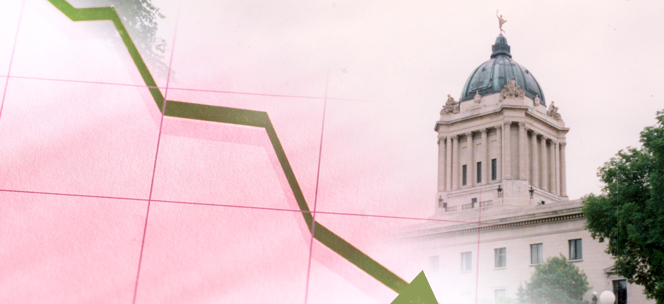
The Manitoba government has fallen into a deep, dark deficit hole and it needs some help climbing out.
The Manitoba government originally projected a deficit of $363 million, but it’s now saying it will reach $1.6 billion. That’s more than four times the original figure.
This huge deficit means more debt and more taxpayer money wasted on interest payments. By the end of this year, the debt will be $33 billion, totalling up about $24,000 per Manitoban.
The interest payments on the debt will be $2.2 billion per year, or about $1,600 per Manitoban.
The interest payments alone make up almost 10 per cent of the entire budget. If the government didn’t have to spend that every year on interest, there wouldn’t be a $1.6 billion deficit, but rather an $800-million surplus.
That’s why government debt matters. If the government was debt-free and had $2.2 billion more to spend or use for tax relief every year, Manitoba could be in a very different place.
Instead, all that money is sent by the truckload to whichever big bank or hedge fund owns the government’s debt.
But wait, it gets worse.
Premier Wab Kinew called it a “structural deficit.” That’s something credit rating agencies, the people who let the banks know how trustworthy someone is, don’t like to hear. A structural deficit is a deficit that will persist even if absolutely nothing is going wrong with the economy.
A structural deficit means Manitoba could be facing a credit rating downgrade if the government doesn’t balance the budget. If that happens, it will be harder for the government to continue to borrow money and the money that it can borrow will be likely be at a higher interest rate, adding more flames to the debt interest fire.
That’s a big problem. Here’s how the government can fix it.
First off, The Manitoba government should not cancel any tax relief. The way to help someone with a bad spending habit is to teach them to save, not to hand them a cheque.
Cutting taxes is also an investment for the future of the province. Right now, professionals looking for a new home and business owners looking to expand won’t look twice at Manitoba because of the high taxes. That means Manitobans are missing out on more services and the government is missing out on increased tax revenue from more people working in the province.
Instead, Kinew needs to look at the spending column of the budget.
The first thing he should do axe is all of the money the government spends on corporate welfare. On average, the Manitoba government spends about $482 million each year on subsidies, according to the Fraser Institute. That practice needs to end.
Then there are the costs to pay bureaucrats. Since 2020, the number of government employees being paid more than $100,000 has increased by 64 per cent. On average, according to the Fraser Institute, government employees are paid 5.5 per cent more money than the rest of us. Cutting the amount of money the government spends on paying employees by 5.5 per cent, would save the government $507 million.
And finally, there is the general culture of overspending that haunts the legislature. Since 2019, government revenues have increased 23 per cent, but spending has increased 32 per cent. That’s unsustainable and part of the reason the government is in this mess.
The latest fiscal update predicts inflation and population growth will increase by 4.5 per cent in 2024. The government needs to reduce spending to that rate or less for this year. Combining this with axing corporate welfare and reducing employee compensation costs would see the government find about $1.8 billion in total savings, eliminating the deficit and leaving a $200 million surplus to help Manitoba in the future.
No government likes to cut spending, but Kinew needs to make the hard decisions and get rid of this deficit now, before it gets worse.



.jpg)

.jpg)
